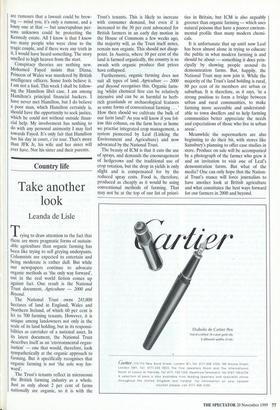Country life
Take another look
Leanda de Lisle
Trying to draw attention to the fact that there are more pragmatic forms of sustain- able agriculture than organic farming has been like trying to sell greying underpants. Columnists are expected to entertain and being moderate is rather dull. But while our newspapers continue to advocate organic methods as 'the only way forward', out in the real world fiction comes up against fact. One result is the National Trust document, Agriculture — 2000 and Beyond.
The National Trust owns 245,000 hectares of land in England, Wales and Northern Ireland, of which 60 per cent is let to 700 farming tenants. However, it is unique among landowners not only in the scale of its land holding, but in its responsi- bilities as caretaker of a national asset. In its latest document, the National Trust describes itself as an 'environmental organ- isation' — one that would, therefore, look sympathetically at the organic approach to farming. But it specifically recognises that organic farming is not 'the sole way for- ward'.
The Trust's tenants reflect in microcosm the British farming industry as a whole. Just as only about 2 per cent of farms nationally are organic, so it is with the Trust's tenants. This is likely to increase with consumer demand, but even if it increased to the 30 per cent advocated for British farmers in an early day motion in the House of Commons a few weeks ago, the majority will, as the Trust itself notes, remain non organic. This should not disap- point. In Austria, where 10 per cent of the land is farmed organically, the country is so awash with organic produce that prices have collapsed.
Furthermore, organic farming does not suit all types of land. Agriculture — 2000 and Beyond recognises this. Organic farm- ing 'whilst chemical free can be relatively intensive and can be as harmful to herb- rich grasslands or archaeological features as some forms of conventional farming ... ' How then should we cultivate the bulk of our farm land? As you will know if you fol- low this column, on the farm here at home we practise integrated crop management, a system pioneered by Leaf (Linking the Environment and Agriculture) and now advocated by the National Trust.
The beauty of ICM is that it cuts the use of sprays, and demands the encouragement of hedgerows and the traditional use of crop rotation, but the drop in yields is only slight and is compensated for by the reduced spray costs. Food is, therefore, produced as cheaply as it would be using conventional methods of farming. That may not be at the top of our list of priori-
ties in Britain, but ICM is also arguably greener than organic farming — which uses natural poisons that have a poorer environ- mental profile than many modern chemi- cals.
It is unfortunate that up until now Leaf has been almost alone in trying to educate the public in what modern farming is and should be about — something it does prin- cipally by showing people around its demonstration farms. But, happily, the National Trust may now join it. While the majority of the Trust's land holding is rural, 80 per cent of its members are urban or suburban. It is therefore, as it says, 'in a strong position to form a bridge between urban and rural communities, to make farming more accessible and understand- able to town dwellers and to help farming communities better appreciate the needs and expectations of those who live in urban areas'.
Meanwhile the supermarkets are also beginning to do their bit, with stores like Sainsbury's planning to offer case studies in store. Produce on sale will be accompanied by a photograph of the farmer who grew it and an invitation to visit one of Leaf's demonstration farms. But what of the media? One can only hope that the Nation- al Trust's stance will force journalists to have another look at British agriculture and what constitutes the best ways forward for our farmers in 2000 and beyond.


























































































 Previous page
Previous page